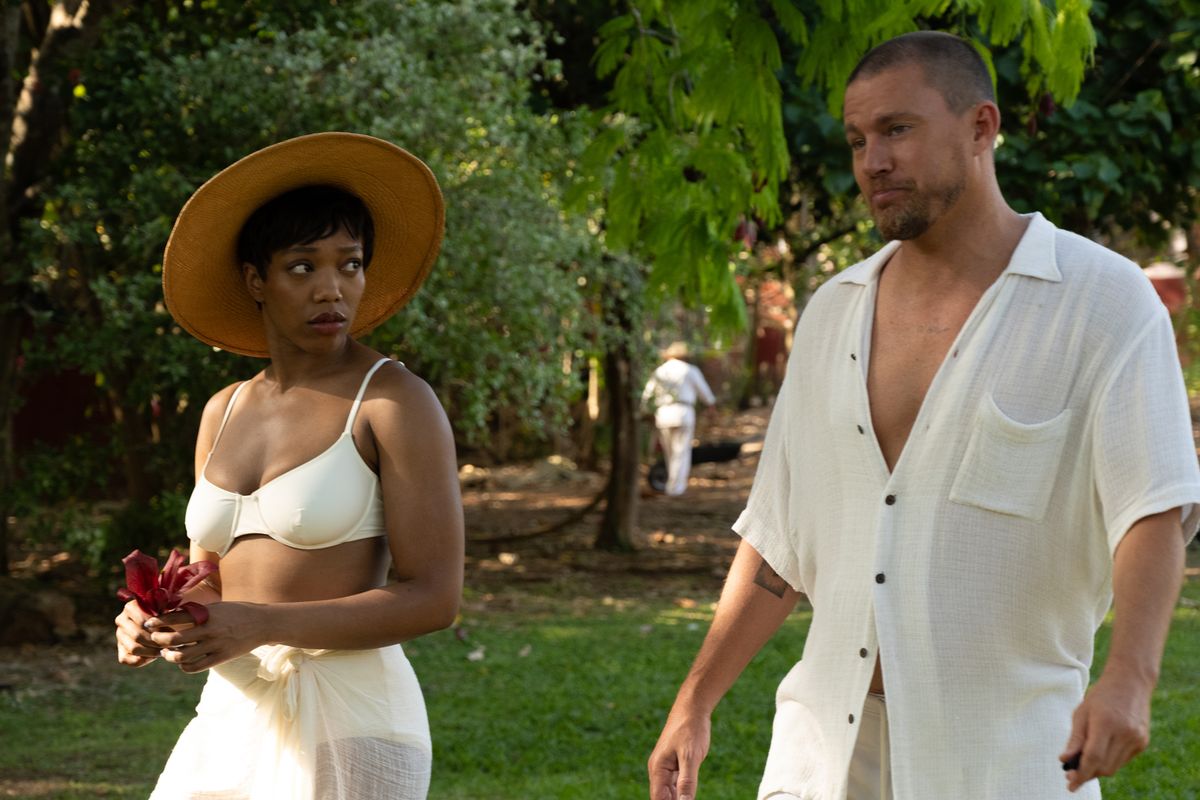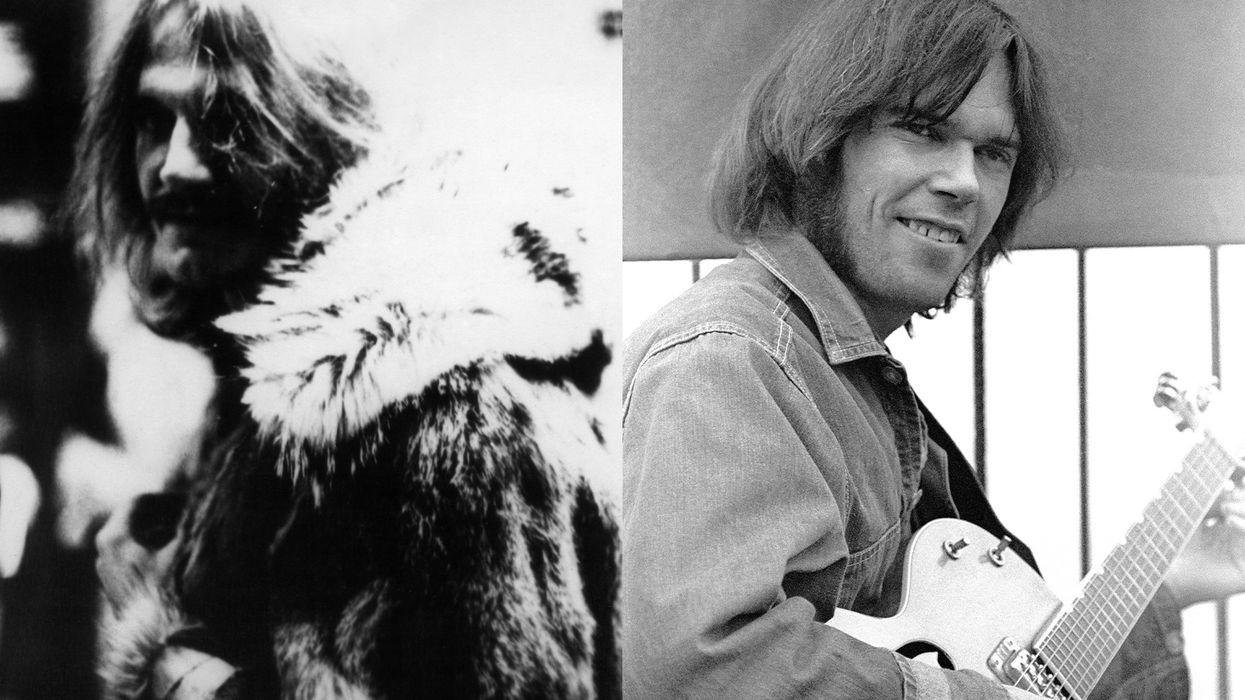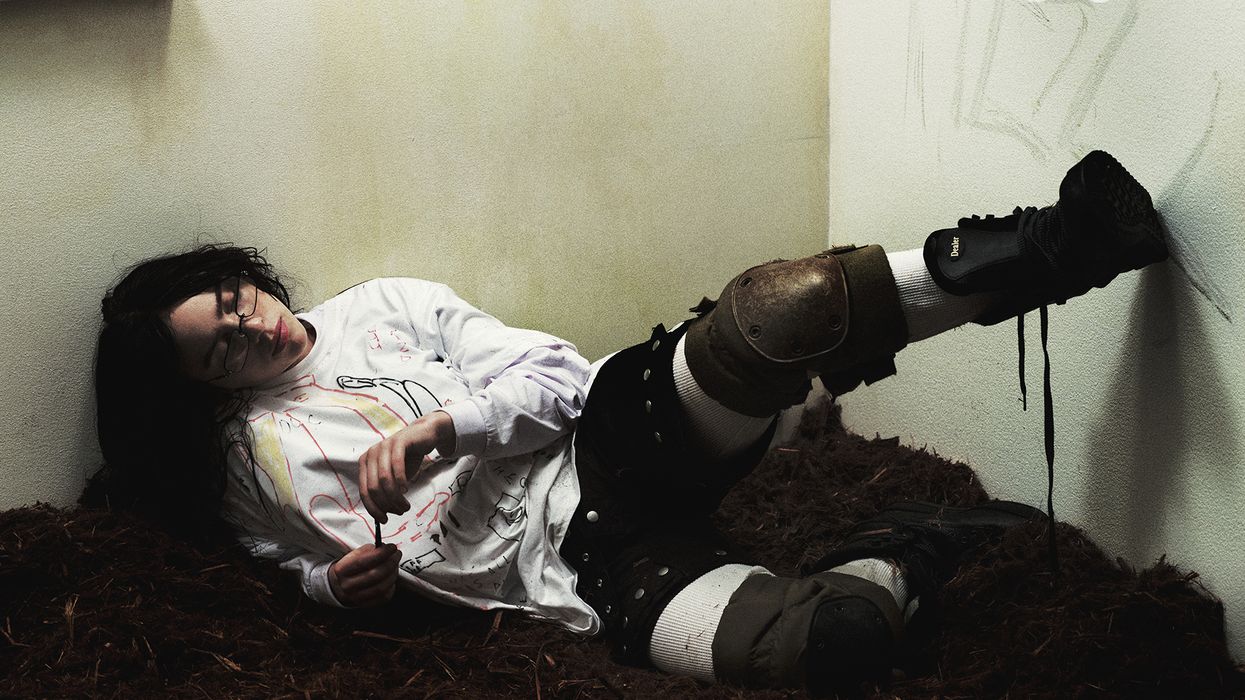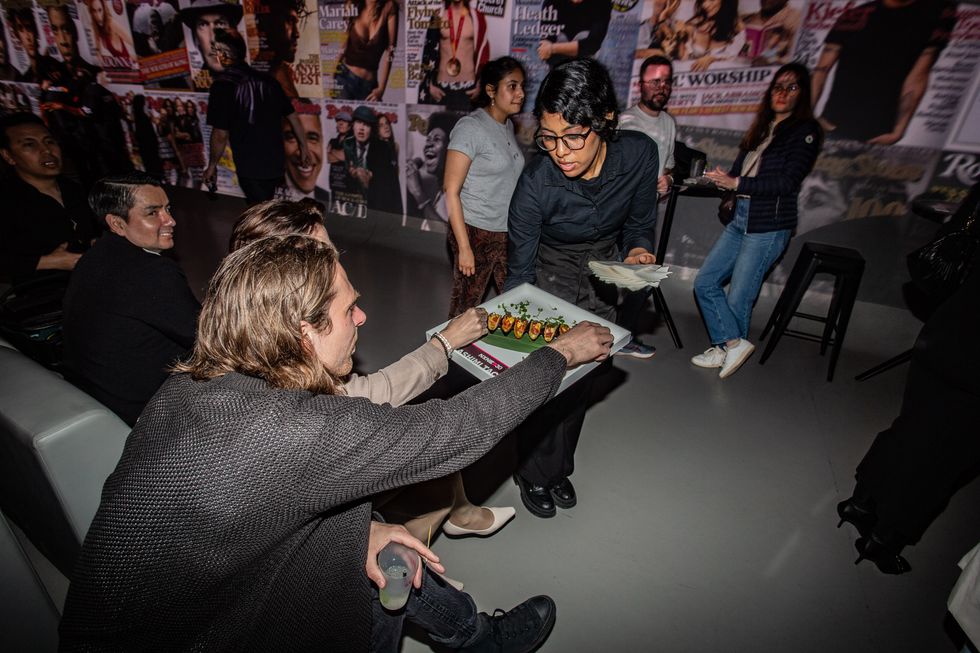There are a few cardinal rules that every screen character should live by: Don’t go in the basement. Never get off the boat. Never go against the family. And for fuck’s sake, never, ever go to a private island where a tech bro and his toxic buddies like to chill out, even if there are bottomless mimosas, psilocybin-microdose bonding, and the billionaire owner looks like Channing Tatum. Especially if he looks like Channing Tatum.
We’ll clarify why in a second, though the less you know about Blink Twice going in, the better — the directorial debut from Zoë Kravitz is extremely careful about how much information gets doled out and when, all the better to make the growing paranoia and eventual escalation of horrors that much more effective. This modus operandi is one reason of many why Kravitz’s smart, savvy, white-knuckler of a thriller will likely get compared to Get Out, and while Jordan Peele’s instant classic has had an overwhelming influence on socially informed scary movies, it’s left a particularly profound imprint on this satirical, highly unsettling tale of “safe” spaces that are anything but. Few films have taken such good advantage of that earlier movie’s structure — and, more importantly, channeled the vibe so astutely — than this toxic-masculinity-in-sheep’s-clothing takedown. And you’ll get the same sensation watching an actor-turned-director nail a tricky tone with such confidence and brio their first time out as well. Kravitz knows exactly how to set this up. And exactly how to knock you down.
Back to Tatum: He’s Slater King, a Silicon Valley hotshot who’s a little bit Jack Dorsey, a little bit Elon Musk and a whole lotta Magic Mike. A while back, King was accused of behavior unbecoming of a CEO and creating hostile work environments, among other things. He filmed a de rigueur apology video and went round all the stations of the redemption-tour cross before disappearing. When the industry mogul came back, he professed to be a whole new him. Therapy and a good deal of soul-searching helped. So did buying a private island where King could chill out.
He also started a foundation, and the organization’s annual gala is where Frida (Naomi Ackie) plans to make her move. She’s a little… obsessed with King. When she was working with the waitstaff during the previous year’s event, Frida got a little chatty with the man of the hour — he said he liked her nails! — and her boss has warned her not to be so informal again. But Frida has bought evening gowns for her and her fellow-server-slash-roommate, Jess (Alia Shawkat), and after they change into the dresses, they sneak into the V.I.P. section. Everything’s cool until Frida’s heel breaks. Cinderella hits the floor. Wouldn’t you know it, Prince Charming himself picks her right up.
The two of them talk until the wee small hours, at which point King asks: Would you and Jess like to come with us to the island? The “us” in question is King’s right-hand man Vic (Christian Slater), a professional chef (Simon Rex), an actor friend (Haley Joel Osment), a tech-wiz wunderkind (Levon Hawke); King’s bodyguard (Chris Costa) and King’s assistant, Stacy (Geena Davis). Also along for the ride: Sarah (Hit Man‘s Adria Arjona), a reality-TV star thanks a long tenure on Hot Survivor Babes; Camilla (Liz Caribel), an app developer who just hit it big; and Heather (Trew Mullen), the self-proclaimed “fat blunt queen.”

Once everyone arrives at this lost paradise, all communication devices have been confiscated (“It’s better without phones,” King coos) and the young women have changed into their customized all-white summer wear, the festivities begin. The afternoons are for lounging by the pool, sipping cocktails. The evenings are for eating Michelin-star–level meals. Late nights involve hallucinogens and other party narcotics. Mornings are for lavish hangover brunches. Rinse, repeat. Vic keeps running around with a Polaroid camera, documenting the endless lost weekend. “Everyone say, ‘Making memories!'” he yells, as the gang poses for a group shot.
It’s at that exact moment that Kravitz drops the title card in an almost subliminal flash — that fact that the film takes its name from a joke that Frida shares with King’s therapist (Kyle MacLachlan), about blinking twice to show she’s in danger, is only the first hint dropped that something sinister may be going down in paradise. There are others. Workers seem to recognize Frida. A maid (María Elena Olivares) who deals with the island’s snake population, because every Garden of Eden is beset by serpents, keeps calling her “Red Rabbit.” A stain on Frida’s dress from dinner magically disappears before she goes to bed. No one seems to know how long they’ve been there, or when they’re leaving. Soon, Jess declares she wants to go home. The next morning, Jess is mysteriously gone. Even stranger: Nobody remembers anyone named Jess being there at all.
From here, Blink Twice starts to up the menace factor from slight simmer to full boil, and what seem like unassuming details or offhanded comments turn out to be clues hiding in plain sight. Everything we’ve mentioned so far is revealed in the film’s trailers, yet even the highlights of the marketing campaign play extremely different on a second viewing. Some stuff is obvious from the get-go, however, like the notion that Kravitz has an incredible sense of how to toy with audiences and sustain tension. She’s a natural born thriller-maker, knowing when to lean on genre conventions and when to tweak them, how to move a camera to create suspense and how to frame a shot in a way that shreds nerves on its own; the way that she and editor continually cut mid-song, mid-sequence or mid-line reading in order to disorient viewers adds immensely to the dread. (That Kravitz cowrote this with E.T. Feginbaum before #MeToo was a catch phrase only makes the use of horror elements that much deeper. It’s a properly outraged reaction conceived before the publicly acknowledged reaction.)

The same goes for Ackie, who gets to use Blink Twice not just as a final-girl showcase but as a reintroduction. A regular TV presence given the breakthrough role of Whitney Houston in I Wanna Dance With Somebody, the British actor was afflicted with the curse handed down to most music-biopic stars, in that she was stuck being judged less in how she crafted a performance and more in terms of accuracy: How Whitney was she? Here, Ackie is simply allowed to step center stage into the spotlight by creating a complicated woman stuck in… well, let’s just say something besides a typical dream-date getaway. And freed from the constraints of having to resurrect the beloved dead, she has the chance to show you what an astounding artist she truly is. Her Frida begins as a fangirl, awkward and fawning. After she catches on to what’s really happening, our hero has to hide the fact that she knows, while trying to plan an exit strategy. Then Ackie unleashes her character’s inner warrior, at which point: Watch out.
You can single out virtually any member of the ensemble for their work here, from Shawkat’s wing-woman-turned-early-warning-signaler to Slater’s particularly oily bro; we’d personally nominate Arjona as the stealth MVP, who makes extremely good use of both the lightly comic chops and take-no-shit attitude she displayed in Hit Man. The true casting coup, though, is Channing, a movie star who’s always looked like the jock you avoided in high school yet studiously worked a screen persona that’s pure sensitive-dude ally. He brings with him an inherent likability that, not unlike the Mr. Nice Guys cast as disguised douchebags in Promising Young Woman, is meant to disarm defenses — Frida’s and yours. It’s not a spoiler to say that his Slater King has secrets, only what those secrets are. But by the time you discover them, you’ve already willingly walked into the film’s trap, mostly because of the handsome, in-touch-with-his-feminine-side Pied Piper blowing that seductive, luxury-vacation tune. Heed the warning in that first paragraph up above.
Some aren’t going to fully buy Blink Twice‘s third act, which does rely on some of the earlier narrative-logic loopholes and strain a few key disbelief-suspending notions close to breaking points. Once the proverbial cats have exited their bags, Kravitz opts for an attack that favors blunt force trauma, with a strong emphasis on that last word. It’s definitely cathartic, even if the messaging behind all of it becomes slightly blurred before the smirking, best-served-cold coda. But there’s so many sharp jabs here, so much well-honed Hitchcockian 101 technique on display, that you can’t dismiss this exercise in horror as social-rage sugar pill. Even by the standards of recent eat-the-rich rage-fulfillment (see: Glass Onion, Saltburn, The Menu), it hits where it hurts. You may, however, need to see it more than once.














 Catering Presented By The Food DudesPhoto by Snapdrg0n
Catering Presented By The Food DudesPhoto by Snapdrg0n Catering Presented By The Food DudesPhoto by Snapdrg0n
Catering Presented By The Food DudesPhoto by Snapdrg0n Catering Presented By The Food DudesPhoto by Snapdrg0n
Catering Presented By The Food DudesPhoto by Snapdrg0n
 Photographer: Raphaëlle Sohier / Executive production: Elizabeth Crisante & Amanda Dorenberg / Design: Alex Filipas / Post-production: Bryan Egan/ Headpiece: Tristan Réhel
Photographer: Raphaëlle Sohier / Executive production: Elizabeth Crisante & Amanda Dorenberg / Design: Alex Filipas / Post-production: Bryan Egan/ Headpiece: Tristan Réhel Photo: Raphaëlle Sohier
Photo: Raphaëlle Sohier Photo: Raphaëlle Sohier/ Photo production: Bryan Egan/ Blazer:
Photo: Raphaëlle Sohier/ Photo production: Bryan Egan/ Blazer:  Photo: Raphaëlle Sohier/ Blazer: Vivienne Westwood/ Skirt :
Photo: Raphaëlle Sohier/ Blazer: Vivienne Westwood/ Skirt : 

